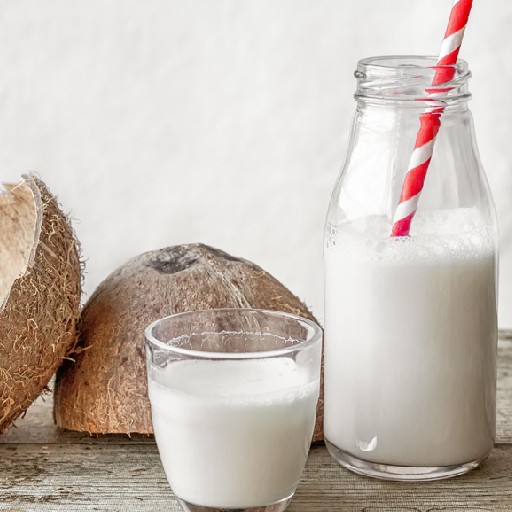Coconut Milk

Coconut Milk
Coconut Milk is an opaque, milky-white liquid extracted from the grated pulp of mature coconuts. The opacity and rich taste of coconut milk are due to its high oil content, most of which is saturated fat. Coconut milk is a traditional food ingredient used in Southeast Asia, Oceania, South Asia, and East Africa. (Source: Wikipedia)
Nutritional Benefit of Coconut Milk:
According to Article written by Jo Lewin (Registered nutritionist) on 27 January 2023, published on BBC good food, Coconut Milk
1. Contains medium-chain fatty acids. Coconuts contain significant amounts of fat, but unlike other nuts, they provide fat that is mostly in the form of medium-chain saturated fatty acids (MCFAs) – in particular, one called lauric acid. What this means is that the fatty acids in coconut oil are made up of a chain of six to 12 carbon atoms, as opposed to the more than 12 found in long-chain fatty acids. This difference in structure has all sorts of implications, from how the fat in coconut milk is digested to how it may influence your body.
2. Is lactose-free. Unlike cow’s milk, coconut milk is lactose-free, so can be used as a milk substitute for those with lactose intolerance. Lactose is the main type of carbohydrate in all mammalian milk, including human, goat and sheep. It's made up of two sugars, and your body needs an enzyme called lactase to adequately digest it. It’s this enzyme that's lacking in those with lactose intolerance.
3. Has anti-inflammatory, anti-microbial and anti-fungal properties. About 50% of the MCFAs in coconut oil are a type called lauric acid, which is converted in the body into a highly beneficial compound called monolaurin, an antimicrobial, anti-fungal and anti-inflammatory that destroys a wide variety of disease-causing organisms. It's therefore thought that the consumption of coconut milk and other coconut-derived foods may help protect the body from infections and viruses.
4. May support cardiovascular health. MCFAs are rapidly metabolised into energy in the liver; it’s because of this that unlike other saturated fats, MCFAs are used up more quickly by the body and are less likely to be stored as fat. Research is mixed, but some recent studies are suggesting that the fats from coconut may not have such a detrimental effect on blood lipids, cholesterol balance and cardiovascular health as once thought. This is certainly one area of research to watch. It should be noted, however, that due to large variances in diet and lifestyle patterns within the various studies, the findings to date may not be conclusively applied to a typical Western diet.
5. May reduce stomach ulcers. One animal study found coconut milk reduced the size of a stomach ulcer by the same amount as that of an anti-ulcer drug. Further studies confirm the mechanism for this is partly due to the milk’s anti-inflammatory properties in combination with positive effects on the growth of the mucosa.


